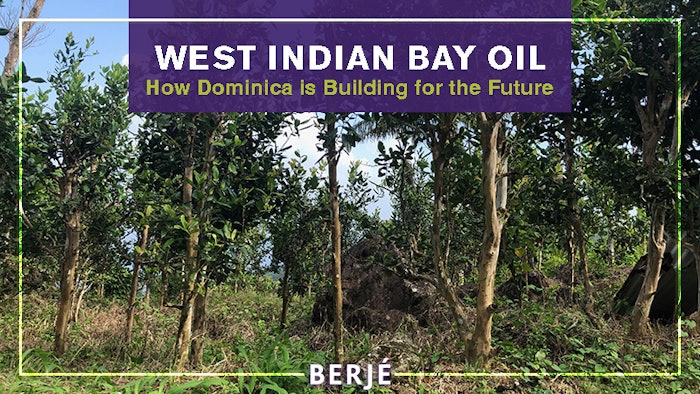
Dominica is a mountainous island country in the southern Caribbean, home to a vibrant tapestry of unique foliage, endangered species, and natural wonders found nowhere else on earth.
Often referred to as the “Nature Island of the Caribbean,” most of the nation’s tropical landscape is comprised of vast rainforests and volcanic peaks encircled by sandy shores. This geography makes Dominica an ideal destination for beach bums and ecotourism but does little to support local communities through opportunities for agriculture. Very few crops can be sewn within the island’s mountainous terrain, save for a handful of treasured botanicals. One of the most important amongst these botanicals is the Pimenta racemose tree, more commonly known as “West Indian bay.”
 Bay oil has played a pivotal role in the economy of Dominica since the 19th century, finding use in a wide range of fragrances including the eponymous “Bay Rum” cologne.
Bay oil has played a pivotal role in the economy of Dominica since the 19th century, finding use in a wide range of fragrances including the eponymous “Bay Rum” cologne.
The West Indian bay tree is firmly established in the culture and economy of Dominica, with records of its cultivation dating back to the early 11th century. The tree takes well to the island’s unique microclimate and fertile volcanic soil, and its rugged versatility allows it to be planted almost anywhere. This makes the West Indian bay tree a vital component of local economies across Dominica – the leaves harvested from the tree provide a vital secondary stream of income to countless farmers, many of whom only have access to small parcels of mountainous land that are not well-suited for more traditional food crops.
West Indian bay trees are primarily cultivated to produce bay oil, which is made by steam-distilling the carefully pruned leaves and twigs of the tree. Bay oil has played a pivotal role in the economy of Dominica since the 19th century, finding use in a wide range of fragrances including the eponymous “Bay Rum” cologne. Its rich and spicy aroma is incredibly distinctive, often described as having a warm clove-like scent with underlying notes of cinnamon, allspice, and black pepper. For many communities throughout Dominica, bay oil is a crucial export that funds further economic development, especially in mountainous rural areas.  In 2019, the Climate Resilience Execution Agency of Dominica was established, and in 2023 it drafted a climate resilience plan to further establish its goals towards maintaining a stable and sustainable economic future amidst a world increasingly impacted by climate change.
In 2019, the Climate Resilience Execution Agency of Dominica was established, and in 2023 it drafted a climate resilience plan to further establish its goals towards maintaining a stable and sustainable economic future amidst a world increasingly impacted by climate change.
However, the export of bay oil came to a sudden and dramatic halt in 2017, when Hurricane Maria brought widespread devastation to Dominica. It is estimated that the storm damaged or destroyed more than 98% of all structures upon the island, resulting in $1.2 billion (approx. £908 million) of damage, losing approximately 226% of its GDP in just one day. To say the event was catastrophic would be an immense understatement.
Despite the scale and scope of the damages wrought throughout the island, Dominica proved itself to be incredibly resilient. In 2019, the nation established the Climate Resilience Execution Agency of Dominica and in 2023 it drafted a climate resilience plan to further establish its goals towards maintaining a stable and sustainable economic future amidst a world increasingly impacted by climate change. Dominica has since made a full recovery from the damages of Hurricane Maria in 2017, a category 5 hurricane that devastated Dominica. In many ways, Dominica is now ahead of other nations when it comes to proactive measurements against the effects of such disasters.
 The farmers and communities of Dominica have poured countless hours into improving their infrastructure, taking a proactive approach to mitigating the effects of climate change and ensuring their natural products have a future in the world economy.
The farmers and communities of Dominica have poured countless hours into improving their infrastructure, taking a proactive approach to mitigating the effects of climate change and ensuring their natural products have a future in the world economy.
These improvements have led to a widespread resurgence in the production of bay oil throughout Dominica, with many rural farming communities reaching or exceeding the production metrics of the past. Distillation of bay oil has remained stable over the last year, and tropical storms have had no impact on the growth or productivity of West Indian bay trees. Supply is strong, and the botanical is taking well to the new improvements at source. By all means, bay oil production is thriving in Dominica once again, yet many in the flavor and fragrance industry remain apprehensive to return.
However, the work that is being done throughout Dominica cannot be ignored, as it represents a vital evolution in the production and future sustainability of essential oils. The farmers and communities of Dominica have poured countless hours into improving their infrastructure, taking a proactive approach to mitigating the effects of climate change and ensuring their natural products have a future in the world economy. By supporting regional essential oils such as bay oil, suppliers can provide support for the communities that have provided these materials to the world for centuries, guaranteeing a stable future for precious botanical ingredients everywhere.
Click to connect with Berjé, Inc. – inquire about their bay oil, request a quote etc.
Disclaimer:
The above paid-for content was produced by and posted on behalf of the Sponsor. Content provided is generated solely by the Sponsor or its affiliates, and it is the Sponsor’s responsibility for the accuracy, completeness and validity of all information included. Perfumer & Flavorist takes steps to ensure that you will not confuse sponsored content with content produced by Perfumer & Flavorist and governed by its editorial policy.










